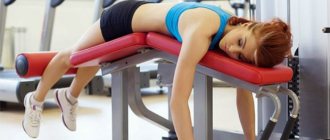Loss of energy, unusually stiff muscles, decreased sex drive. These symptoms may seem unrelated, but there is one condition in athletes that they all have in common: overtraining syndrome. It may seem like a fantasy to some, but this condition exists and requires treatment. In this article we will tell you what overtraining when running is and its main symptoms, and also give some recommendations for eliminating these unpleasant symptoms.
What is overtraining?
Overtraining is a persistent, unexplained decrease in performance that continues even after you've had a long rest. The main causes of overtraining are ineffective recovery and external stress, which make runners more susceptible to stress.
This is more than simple post-workout fatigue. Perceived profound fatigue leads to longer-term problems requiring longer recovery periods. Your symptoms may indicate another problem, so if you've been suffering from unusual levels of fatigue for more than six months, it may be worth seeing your GP to rule out chronic fatigue syndrome.
How to deal with overtraining
First of all, Overtraining syndrome needs to give up training and direct all efforts to reduce stress: get enough sleep, eat a balanced diet, go to the sauna or get a massage. You can also try practices to normalize the nervous system, such as meditation and proper breathing.
When you feel better, introduce gentle exercises where performance cannot be measured. This is especially important for people who are used to pushing themselves in training and competing with others.
Choose light activity, preferably from a sport unrelated to yours. It will help you recover faster and support the condition of your heart and blood vessels.
As a rule, symptoms of overtraining go away Overtraining syndrome 3–5 weeks after the start of rest. You may need less time to recover, but be aware that insufficient recovery may result in another episode of SPT.
For those who have already experienced overtraining, the risk of relapse is quite high. For example, in one study of Psychological monitoring of overtraining and staleness among swimmers who earned SPT in the first season, 91% of athletes experienced it again in the next three years of training. Of those who did not encounter this problem at the very beginning of their sports career, only 30% subsequently suffered from the syndrome.
Listen to your feelings and don’t rush to return to the gym as soon as you stop feeling sick from just the sight of a barbell or running shoes.
Who is at risk for overtraining syndrome?
Unexplained extreme fatigue is common among both professional and recreational athletes, especially if you've recently increased your mileage.
Take a close look at your training schedule. Do you have enough time to recover? Calculating the required recovery time requires constant attention. As your performance improves, you recover faster from your workouts. If you're feeling particularly tired or suffering from minor injuries, take a day off or go for a light jog. It is better to approach the race a little undertrained than not to make it to the start at all.
Long-distance runners seem to be more susceptible to overtraining syndrome. Even if you train and recover properly and don't run long distances, you still run the risk of overtraining. If you are very busy at work, under stress, or experiencing relationship problems, this may affect your workout and cause the syndrome.
Treatment
If you nevertheless reach a point where training begins to do more harm than good, do not be alarmed. Of course, you will have to give up strength training for the duration of treatment, but it won’t take that much time. The restoration will take place in two stages.
Stage 1
- small aerobic exercises. Work out for 20 minutes on any cardio machine three times a week. Monitor your heart rate: it should not exceed 60% of your maximum level (a table for calculating heart rate norms can be seen here). On non-workout days, you can do walking and yoga. This stage will take up to 3 weeks.
Stage 2.
Gradually introduce small strength loads into your program for all muscle groups. You can exercise twice a week. Consider the completion of rehabilitation the moment when training again begins to bring visible results.
Don't forget that recovery is not only about proper training, but also about healthy sleep and good nutrition.
You need to get enough sleep and consume enough calories and microelements that your body needs. Be sure to rest and heal your nervous system - with a calm environment, calming activities, and relief from stress in everyday life. Drink green tea: it contains L-theanine, which has a beneficial effect on your psycho-emotional state.
Good health to you and happy training!
Body signals during overtraining
Elevated resting heart rate Overtraining can manifest itself as a slightly elevated resting heart rate. Make it a habit to measure your pulse immediately after waking up. An increase of 10 beats per minute or more indicates that your body has not recovered from recent workouts.
Sleep Disturbance If you suffer from insomnia, can't fall asleep, or experience sleep disturbances, overtraining may be the cause. After a workout, the body needs time to calm down, so long workouts at the end of the day before going to bed are highly undesirable.
Lack of appetite or weight loss You're working out harder than ever, which means you need a balanced diet. Loss of appetite or persistent weight loss should alert you.
Frequent colds and viruses This means that your immune system has failed. If you notice that you have a harder time maintaining your pace or that even easy runs tire you out, you may be suffering from overtraining.
Muscle injuries and pain take longer to heal If you exercise too much, your body does not recover effectively. You will notice that muscle soreness lasts a few more days than usual.
Decreased Performance in Races That's what really gets runners to notice - the decline in effective training performance. If you're training harder than ever but still falling behind, something may be wrong.
In addition, when overtraining occurs, athletes may experience a range of symptoms that are difficult to pin down, such as:
- depression or mood disorders;
- decreased libido;
- anemia;
- dizziness;
- loss of motivation to compete.
State Budgetary Institution "Kuzbass Clinical Center for Physical Therapy and Sports Medicine"
MEMO FOR A SPORTS DOCTOR SYMPTOMS OF OVERTRAINING. RESTORATION OF PERFORMANCE
In sports practice, there is a pattern that the higher the level of an athlete, the more often he experiences symptoms of a “sports disease” that is quite common in the modern world - overexertion or overtraining syndrome.
Overexertion syndrome or overtraining is an imbalance between training and recovery
. This is the body's response to excessive training load, usually combined with preparation for or participation in major competitions, and insufficient time to recuperate.
There are additional factors that provoke this condition:
- emotional stress
- unfavorable psychological climate in the team
- frequent travel, flights crossing time zones, resulting in lack of sleep and nutrition
- intense training and participation in competitions, despite feeling tired.
- early start of training after illness.
- dietary features where the diet does not have enough calories, vitamins, and simple carbohydrates predominate in the food.
- a large number of injuries and frequent infectious diseases.
- hormonal changes caused by exhausting training negatively affect the athlete's immune system.
- disorders in the musculoskeletal system in the form of decreased elasticity of ligaments and muscle elasticity. The activity of antagonist muscles and, accordingly, coordination of movements are disrupted, defensive reactions and attention deteriorate, which explains the frequency of injuries.
How can you spot the symptoms of overtraining and differentiate them from normal feelings of fatigue?
These are the following symptoms:
- feeling of constant fatigue, often accompanied by sore muscles
- the need to exert more and more effort in training while simultaneously reducing athletic performance - this is what is characteristic of overexertion syndrome.
- sleep disturbances, difficulty falling asleep, frequent awakenings.
- disorders in the emotional sphere - apathy, lethargy, reluctance to train, sometimes, on the contrary, playfulness, a frivolous attitude towards training, there may be increased irritability.
- discomfort or pain in the heart area, rapid heartbeat at rest, possibly increased blood pressure. (In young athletes, on the contrary, heart rate and blood pressure may decrease).
- loss of appetite, the tongue becomes covered with a white coating, and when it sticks out of the mouth, its tremor (trembling) is detected
- Possible weight loss
- in female athletes, menstrual irregularities up to amenorrhea.
What should an athlete do?
1.Together with the coach, adjust the training process and preparation for competitions.
2. Contact a sports doctor to draw up a recovery program to prevent the pathological process from worsening.
3. It is important to identify symptoms of overtraining as early as possible, because the time required for complete recovery is longer than the time during which the athlete was in this state.
4. The most effective treatment is to change the training regimen, both by reducing their number and time.
5. Avoid long and intense exercises, technically complex ones and those aimed at endurance.
6. In severe cases of overtraining, classes are stopped for 1 - 3 weeks, active rest is prescribed with gradual involvement in a sports regime.
7. Classes should begin with general physical training, light load, and only in the process of improving the general condition of the athlete, move on to special training.
How to Avoid Overtraining
?
The athlete and coach should closely monitor the appearance of the first signs of this phenomenon. If an athlete is seriously involved in sports, it is advisable for him to keep records of training sessions, noting his well-being during and after the session. The diary should include any changes in body weight, appetite, note the duration of sleep, etc.
Pharmacological means of restoring performance and preventing overvoltage
1.Vitamins play an important role.
They are regulators of metabolism; with their help, biologically active substances are formed in the body - enzymes that participate in the chemical transformations of carbohydrates, fats and proteins.
In sports medicine, complex vitamin preparations with microelements are used - Vitrum, Centrum, Multitabs, Supradin
Alphabet
has proven itself well .
2.As practice shows, these products are best used with adaptogens of animal and plant origin, which increase performance and resistance to various adverse factors.
They can also be complex, such as Elton, Leveton and Safinor, and single preparations in the form of tinctures - ginseng, Leuzea, Schisandra, Rhodiola, Zamanika, Aralia, Eleutherococcus, 20-30 drops on an empty stomach 2 - 3 times a day. The same properties are found in the extract from the horns of deer, wapiti and deer - Pantocrine, 30-40 drops (or 1 - 2 tablets) 2 - 3 times a day, as well as beekeeping products - Apilak (royal jelly), honey with beebread.
3.Sometimes it is necessary to take nootropics to increase the level of energy metabolism of brain cells
– Cavinton, Nootropil, 2 caps. 2–3 times a day, for a course of 3 weeks.
4.Among the drugs with plastic and energetic effects, potassium Orotate, Riboxin 2 tablets 3 times a day, Mildronate 2 caps are prescribed. 3 times a day.
For the same purpose, the homeopathic drug Cralonin (Heel, Germany) is used, 10 drops 3 times a day on an empty stomach.
5.Sedatives
used in the afternoon - valerian extract 2 - 3 tablets at night, St. John's wort extract Negrustin 2 caps.
per day, Novo-Passit 1 - 2 tablets daily for a course of 2 - 3 weeks, Valerianaheel (Heel, Germany) 15 drops 2 - 3 times a day. To stimulate the immune system, a course of Echinacea compositum S (Heel, Germany) in the form of injections is indicated. The diet of an overtrained athlete
should be high in calories and contain large amounts of animal and vegetable protein. Additionally, the menu includes potassium-containing products - dried apricots and baked potatoes. A special place in the treatment of overexertion syndrome is occupied by physiotherapeutic means - therapeutic swimming, bathhouse, Charcot's shower and, of course, restorative massage.
Sports doctors, organizational and methodological room of the State Budgetary Institution of Health Care "KTs LFK and SM". 2012
How to get in shape?
So, you have discovered the symptoms of overtraining, it’s time to figure out how to deal with it. Just a few adjustments to your training can help ensure a long and happy fitness life. The main thing is to really regularly monitor your well-being, monitor your stress level, appetite, state of mind, etc. It would be ideal to take blood tests. By doing this, you can avoid this problem altogether. But if not, then you need to do the following:
Rest Your body recovers during periods of rest - this is the time when you really benefit from all your hard work. Cross-training certainly has its place, but you still have to give your muscles a break.
Relax Don't feel guilty about getting enough rest. This won't harm your running or your fitness - getting the right amount of rest will improve your progress.
Get rid of stress In addition to physical recovery, you need to isolate other sources of stress in your life that may be contributing to poor health.
Eat Right Your body needs the right fuel to perform hard work at its best. A diet consisting of at least 55% carbohydrates, as well as protein and plenty of fresh fruits and vegetables, will provide the right combination of nutrients for your training.
Causes
- Exercising too often
at the limit of possibilities. You can exercise “to failure” no more than once a week, otherwise microtraumas accumulate in the muscles, and the nervous system is constantly exposed to stress and “burns out.”
- High stress levels
in everyday life.
- Monotonous workouts
for a long time. Lack of changes in the program will not only not bring you good results, but will also harm the body.
Ready to run again?
It is almost impossible to develop a universal recovery program for such a unique problem. But a smart approach is to take a couple of weeks of complete rest before returning to light, short running or cross-training.
Allow time for rest and recovery, gradually increasing your training volume over 6-12 weeks - of course, keeping in mind the problems that led you to overtrain in the first place. This condition can disrupt your progress in the short term, but learning to recognize the signs of overtraining is a skill that will help you throughout your running career, making you a stronger athlete.
How else can you control yourself?
1. Keep a training diary
, in which you record not only the speed, distance or weight taken, but also
notes about your well-being
and mood.
Keeping daily records will help you spot a decline in enthusiasm and performance. 2. Analyze your attitude towards classes. If you no longer experience positive emotions, and are replaced by irritability and fatigue, most likely you are giving yourself too much stress and do not have time to rest after it. 3. Consult with an instructor
or more experienced athletes. Sometimes it's only an objective look from the outside that allows you to notice that you're training too much.
This you need to know: pulse zones
There are five heart rate zones, which differ from each other in the result of training. Find out which ones improve your heart health, burn fat and train endurance.
Stages and symptoms of overtraining
It must be said that not all experts consider overtraining to be a common sports disease. Thus, Canadian coach Christian Thibodeau noted that only once in his life had he observed a classic case of overtraining. According to Thibodeau, overtraining serves as an excuse for many athletes for not wanting to train hard and is caused by the inability to properly recover from the load. We will talk about restoration below, but for now we note that if the Canadian specialist is right, then not in everything. The fact is that there are usually three stages of overtraining with different symptoms.{banner_st-d-1}
OVERWORK.
Extreme fatigue, observed after a large and prolonged load, for example, multi-day competitions. Characterized by general fatigue, lethargy, etc. In female athletes, overwork can lead to disruption of the normal course of the menstrual cycle (on average in 11-12% of cases). If fatigue is a normal physiological reaction, then overfatigue is a prepathological condition, a background against which various pathological changes easily arise and develop in the organs and systems of the body.
OVERVOLTAGE.
A pathological change that occurs with excessive physical and emotional stress. It can occur both in individual organs (overstrain of the heart, bones, etc.), or in several simultaneously. For example, gymnasts often experience overstrain of the tibia and metatarsal bones, boxers – the metacarpal bones, and weightlifters – the arches of the lumbar vertebrae. In the initial stages, overstrain of individual organs may not cause any complaints and may not affect athletic performance. You can find out about it during this period only by using objective methods of medical monitoring (electrocardiograms, blood and urine tests, x-ray examination of the bone apparatus). However, if you do not take timely measures, do not stop training sessions for a while, do not carry out medicinal and restorative treatment, etc., changes that are reversible in the initial stages become irreversible and turn into a disease of one or another organ.
ACTUALLY OVERTRAINING.
A condition in which the leading symptom is overstrain of the central nervous system, that is, neurosis. The athlete becomes irritable, touchy, his sleep and appetite are disturbed, and he develops an aversion to training. Coordination of movements worsens, heart rate changes, blood pressure rises, and ventilation and lung capacity often decrease. A decrease in the secretion of anabolic hormones due to depletion of hormonal activity leads to slower tissue growth. So, Thibodeau is talking about the last - third - stage. But the first one, and even more so the second one, may well cause you a lot of trouble, seriously disrupting your training process.
Introduction
Overtraining is a special condition of the body that occurs due to an imbalance between the phases of the training process and rest; in simple words, overtraining occurs when the volume and intensity of training exceeds the recovery period.
Overtraining affects not only the physiological aspects of human health, but also neurological, emotional and behavioral ones. And in this article we will find out in detail what symptoms of overtraining are inherent in each aspect. But we'll start with the reasons for overtraining.










